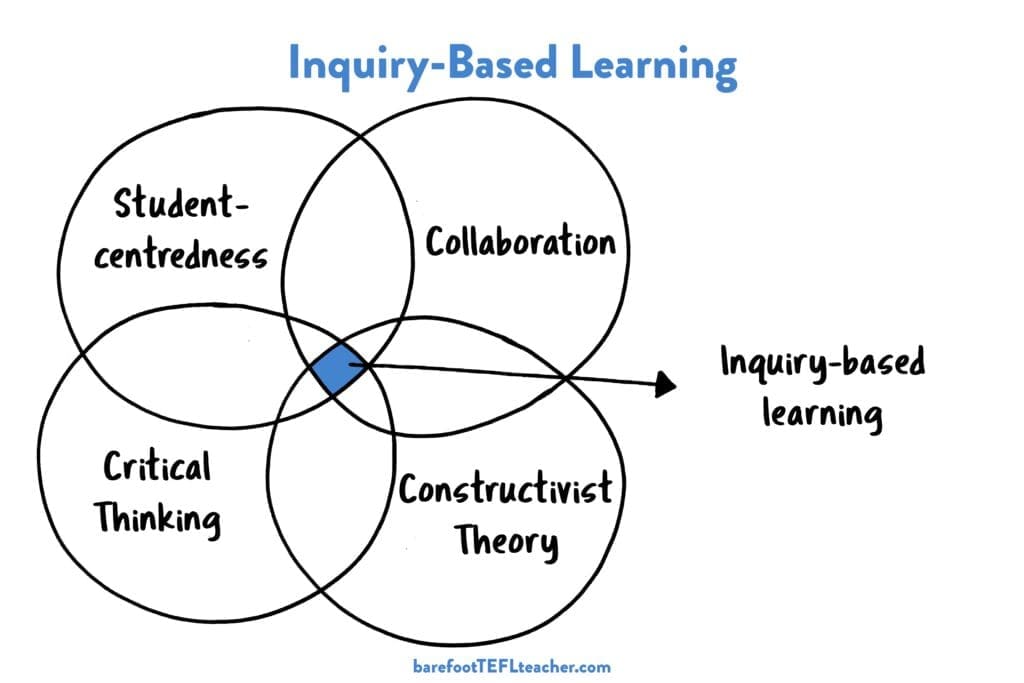
Inquiry Based Learning: Unlocking Curiosity
Inquiry based learning is a student-centered approach that encourages students to ask questions and investigate real-world problems. Students can learn through inquiry, instead of being told facts directly. They can learn through curiosity, finding, and working together.
IBL is all about sparking natural curiosity. It empowers students to steer their educational ship, exploring the vast oceans of knowledge through questions, investigations, and hands-on discoveries.
The importance of inquiry cannot be overstated. It’s the secret sauce that transforms passive data absorption into an active quest for understanding. Gone are the days of rote memorization and one-size-fits-all teaching. The modern educational landscape demands more engagement, critical thinking, and personalized experiences that prepare learners for real challenges outside the classroom walls.
It is an exciting shift from teacher-led monologues to student-centered dialogues, where every voice matters and every question leads to new possibilities. Dive into the world of IBL and see how it’s reshaping education, one inquisitive mind at a time!
You probably heard of Inquiry Based Learning in professional development or staff meeting and it might sound daunting. But it can be exciting to implement inquiry learning for teacher and students.
According to What is Inquiry Based Learning? A Guide for Educators an inquiry approach, students must:
- ask thought-provoking questions
- investigate widely and deeply
- make sense of information to build new knowledge
- develop a solution or formulate opinions
- present or share their new understanding with others
- have a valuable learning experience that leads to taking some form of action
- reflect on what they learned and how they learned it.
Unlocking Potential with Inquiry-Based Learning

Why does inquiry-based learning take center stage in modern education? At its core, inquiry is more than just a teaching method—it’s a catalyst for curiosity and exploration. Let’s delve into why inquiry truly matters.
The Crucible of Critical Thinking and Problem-Solving
One cannot overstate the importance of critical thinking and problem-solving skills in today’s world. Inquiry-based learning does more than just impart knowledge—it challenges students to ask questions, think critically, and solve problems. These skills are indispensable, as they form the bedrock upon which learners can build successful careers and make informed life choices.
Engagement and Empowerment in the Classroom
Nothing ignites the spark of learning more than genuine engagement. Inquiry-based methods put students in the driver’s seat of their education, fostering a sense of ownership and empowerment. As learners traverse topics through inquiry, their natural curiosity is stimulated, leading to deeper engagement and a vested interest in their learning journey.
Cultivating Lifelong Learners
The value of inquiry extends far beyond the classroom. Inquiry methods instill a mindset oriented towards lifelong learning, equipping individuals to continuously adapt and grow in an ever-changing world. By fostering the inquiry mindset early on, we prepare learners not just for tests and grades, but also for the unpredictable and dynamic nature of real life.
Inquiry-Based Learning Model Unveiled
Inquiry-Based Learning (IBL) is an educational strategy that empowers students to guide their own learning through a cyclical process of questioning, researching, and reflecting. But what does this model actually look like in action? Let’s break down the essential steps and explore how they support an effective learning environment.
Understanding the Cycles and Models of Inquiry
Inquiry isn’t a one-size-fits-all approach. It can be imagined as a journey with various paths, but most models share a core cyclical nature. The cycles reinforce the idea that learning is continuous, and knowledge is constructed progressively. Each cycle builds on the previous, deepening understanding and promoting advanced cognitive skills.
The Steps in the Inquiry Process
- Questioning: It starts with curiosity. Students are encouraged to ask questions that pique their interests or challenge their understanding of a subject.
- Researching: This phase involves gathering information and evidence to delve into the query. It’s where the students become explorers in the vast landscape of knowledge.
- Creating: Students produce a product or develop a concept based on their research. It’s the practical application of their findings.
- Discussing: Collaboration is key. Sharing insights and challenging each other’s ideas help to refine their understanding and foster a community of learners.
- Reflecting: Finally, looking back on what has been learned and considering how it applies to the broader context cements the knowledge and prepares students for the next inquiry cycle.
How Inquiry Relates to Constructivist Teaching Theories
At the heart of IBL is the constructivist belief that learners construct knowledge rather than passively absorb it. Inquiry-based learning puts this theory into practice by having students actively engage with concepts and issues. As they navigate through the inquiry process, they build their understanding through experience, which is a cornerstone of constructivist teaching.
By dissecting the Inquiry-Based Learning Model, we uncover the intertwined layers of student agency, critical thinking, and experiential learning—all essential for preparing inquisitive minds for the challenges of the real world.
The Art of Asking Questions
Inquiry-based learning thrives on the art of posing the right questions. At the heart of this educational approach is the ability to stimulate deeper thinking and foster a sense of curiosity. Understanding how to engage in effective questioning strategies can transform the learning environment into a thriving hub of critical thinking and innovation.
The Power of Socratic Questioning to Stimulate Deep Thinking
The Socratic method is not just a relic of ancient Greece—it’s a timeless tool that encourages learners to delve into the why and how, rather than just the what. Socratic questioning pushes students to question their own assumptions and challenges them to find answers through reflection and discussion.
How to Craft a Thought-Provoking Problem Statement
At the core of inquiry is the problem statement—a question or challenge that acts as a catalyst for exploration. Crafting a compelling problem statement is critical; it should be clear but complex enough to open up avenues of investigation and debate. The goal is to ignite the intellectual curiosity of students, prodding them to embark on a quest for knowledge and understanding.
Strategies for Teachers to Encourage Students to Ask Meaningful Questions
- Modeling curiosity: By showcasing their own inquisitiveness, teachers can inspire students to ask more questions.
- Creating a safe space: Establishing an environment where all questions are welcomed and encouraged helps students feel comfortable to inquire and explore.
- Using question stems: Providing a framework for questioning can help students formulate their thoughts and provoke deeper analysis.
- Encouraging reflection: Students need time to think about what they’ve learned and consider what gaps in understanding they may still have.
- Implementing peer-to-peer question sessions: Encourage dialogue and interaction among students to develop a community of learners who seek answers collectively.
Engaging Students in the Inquiry Process
The heart of inquiry-based learning lies in actively engaging students, making sure they’re the ones steering their learning journey. It’s about shifting the focus from a teacher-led classroom to a student-centered environment. So, how do we immerse students in the inquiry process to the point where curiosity becomes their compass? Let’s dive into some practical strategies.
Student-Centered Learning and Active Learning Strategies
Student-centered learning is all about giving learners the wheel. Imagine a classroom where students’ questions form the roadmap for exploration. Active learning strategies can be your best ally here, encouraging students to participate, discuss, and reflect. It might look like this:
- Brainstorming sessions to explore what students know and want to learn.
- Group projects that foster collaboration and different perspectives.
- Hands-on activities to connect concepts with experience.
Techniques to Increase Student Participation
Ownership of learning is crucial for engagement. It’s akin to giving students a key to their own educational pathway. To unlock their potential, consider:
- Setting up learning stations that allow freedom of choice and self-paced exploration.
- Encouraging peer-to-peer teaching, where students explain concepts to each other.
- Utilizing entry and exit tickets to prompt inquiry at the start and reflection at the end of lessons.
Formative Assessment’s Role in Inquiry
Formative assessment isn’t just about evaluation—it’s a catalyst for inquiry. By providing timely feedback, you’re essentially giving students the GPS to navigate their learning journey. This can be done through:
- Short quizzes that help students and teachers gauge understanding.
- Interactive discussions that allow for immediate feedback and course correction.
- Regular reflection opportunities which encourage metacognition and deeper inquiry.
Implementing these strategies with gusto can transform your classroom into a buzzing hive of inquiry where every student feels empowered to ask questions, seek answers, and truly own their learning experience. Ready to give it a try?
Keep Learning
6 Keys Culture of Inquiry You Need to Know in Classrooms
Provoke and Release Strategy Use Learning Something New
Good Questions are Empowering Authentic, Respectful and Invitational
Wrapping Up: The Transformative Journey of Inquiry-Based Learning
The dynamic world of Inquiry-Based Learning (IBL), it’s undeniable that the benefits of embracing this approach are extensive. IBL isn’t just another educational fad; it’s a profound shift towards a more engaged, thoughtful, and student-centered form of education. By incorporating IBL, we cultivate critical thinkers, inquisitive minds, and lifelong learners.
Inquiry-Based Learning is not merely a methodology—it’s a lens through which students view the world. It’s about igniting the spark of curiosity and fueling the fire of discovery. When we empower our students to ask questions and seek out answers, we’re doing more than teaching them facts; we’re guiding them towards becoming stewards of their own education and innovators for the future.
Educators and trailblazers are invited to learn and join a vibrant community committed to the transformative power of inquiry. Together, we can share successes, navigate challenges, and shape a generation that views every question as an opportunity. The journey is ongoing, and there’s a place for every educator in this movement towards a brighter educational paradigm.
So, take the leap, engage with Inquiry-Based Learning, and witness the transformation in your classroom and beyond. Let’s make learning an adventure that never ends!
- Reignite passion for teaching and learning in your classroom.
- Foster a culture of curiosity, collaboration, and problem-solving.
- Share your journey with a global network of forward-thinking educators.
